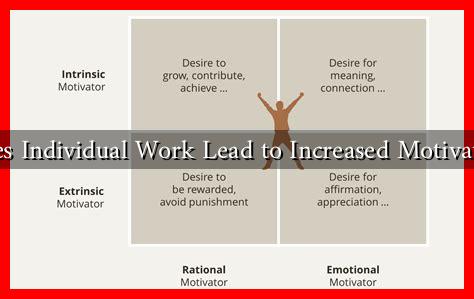-
Table of Contents
Does Individual Work Lead to Increased Motivation?
In today’s fast-paced work environment, the debate over whether individual work fosters greater motivation is more relevant than ever. As organizations strive to enhance productivity and employee satisfaction, understanding the dynamics of individual work becomes crucial. This article explores the relationship between individual work and motivation, supported by research, case studies, and practical examples.
The Psychology of Individual Work
Individual work, often characterized by autonomy and self-direction, can significantly impact motivation levels. According to Self-Determination Theory (SDT), individuals are more motivated when they experience autonomy, competence, and relatedness. Here’s how individual work aligns with these psychological needs:
- Autonomy: Working independently allows individuals to make choices about how they approach tasks, leading to a sense of ownership and responsibility.
- Competence: Completing tasks independently can enhance feelings of competence, as individuals can see the direct results of their efforts.
- Relatedness: While individual work may seem isolating, it can also foster a sense of connection when individuals share their successes with colleagues.
Case Studies: Success Through Individual Work
Several organizations have successfully implemented individual work strategies to boost motivation and productivity. Here are a few notable examples:
- Google: Known for its innovative work culture, Google encourages employees to spend 20% of their time on personal projects. This policy has led to the creation of successful products like Gmail and Google News, demonstrating how individual work can drive motivation and creativity.
- Buffer: The social media management platform allows employees to choose their work hours and locations. This flexibility has resulted in higher job satisfaction and motivation, as employees feel trusted and valued.
- Basecamp: The project management software company emphasizes individual work by allowing employees to set their own goals and work at their own pace. This approach has led to increased motivation and a strong sense of ownership among team members.
Statistics Supporting Individual Work
Research supports the notion that individual work can lead to increased motivation. A study conducted by Gallup found that employees who have the opportunity to work independently are 12% more productive than those who do not. Furthermore, a survey by FlexJobs revealed that 73% of respondents reported increased productivity when working remotely, a form of individual work.
Challenges of Individual Work
While individual work has its benefits, it is not without challenges. Some potential downsides include:
- Isolation: Working alone can lead to feelings of loneliness and disconnection from the team.
- Overwhelm: Without proper support, individuals may feel overwhelmed by their responsibilities.
- Lack of Collaboration: Individual work can limit opportunities for collaboration, which is essential for creativity and problem-solving.
To mitigate these challenges, organizations should foster a culture that encourages communication and collaboration, even in individual work settings. Regular check-ins, team meetings, and collaborative tools can help maintain a sense of community.
Conclusion: The Balance Between Individual and Team Work
In conclusion, individual work can indeed lead to increased motivation when it aligns with employees’ psychological needs for autonomy, competence, and relatedness. Organizations that embrace individual work strategies, as seen in the case studies of Google, Buffer, and Basecamp, can reap the benefits of enhanced productivity and job satisfaction. However, it is essential to strike a balance between individual and team work to avoid potential pitfalls such as isolation and lack of collaboration.
Ultimately, fostering an environment that values both individual contributions and teamwork can create a motivated workforce ready to tackle challenges and drive innovation. For further reading on motivation in the workplace, consider exploring resources from the Gallup Organization and FlexJobs.

